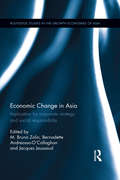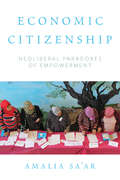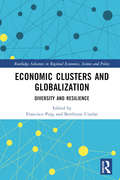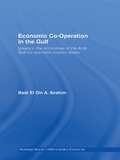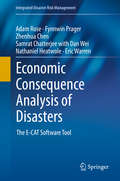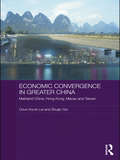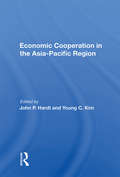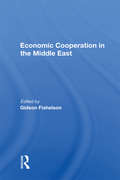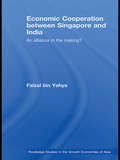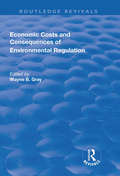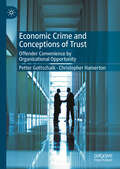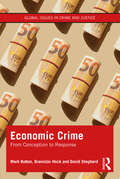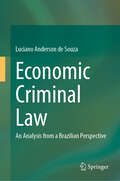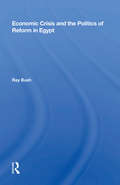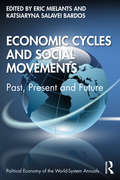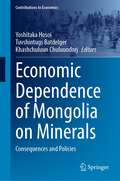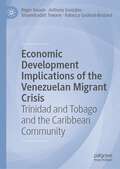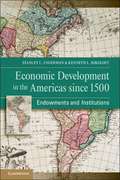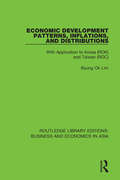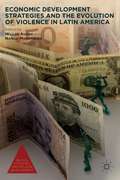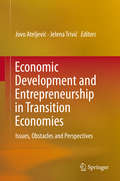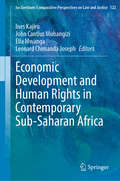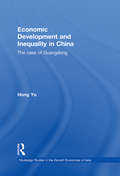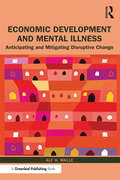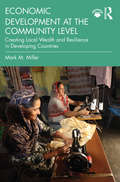- Table View
- List View
Economic Change in Asia: Implications For Corporate Strategy and Social Responsibility (Routledge Studies in the Growth Economies of Asia)
by Jacques Jaussaud Bernadette Andreosso-O’Callaghan M. Bruna ZolinSince the 2008 global economic crisis, East Asian economies have faced a number of macroeconomic issues including China’s new growth model, the middle-income trap in developing East Asian countries, and the growing natural fibre market and its socio-economic implications. This book addresses these key topical issues which East Asian economies are facing today. Written by international experts in the area of Asian economics and business, it presents the most recent macroeconomic outlook in the region and then goes on to analyse a number of business corporations and industry-related cases, focussing on the theme of firms’ strategies.Examining the links between environmental and financial performance, corporate social responsibility and the transfer of environmental management, financial accounting standards, the relationship between corporate sustainability activities and corporate profit, and the different cultural approaches towards business ethics, this book provides both practical strategies and new theoretical insights. As such it will appeal to students, scholars and practitioners interested in Asian business and economics.
Economic Citizenship: Neoliberal Paradoxes of Empowerment
by Amalia Sa'ArWith the spread of neoliberal projects, responsibility for the welfare of minority and poor citizens has shifted from states to local communities. Businesses, municipalities, grassroots activists, and state functionaries share in projects meant to help vulnerable populations become self-supportive. Ironically, such projects produce odd discursive blends of justice, solidarity, and wellbeing, and place the languages of feminist and minority rights side by side with the language of apolitical consumerism. Using theoretical concepts of economic citizenship and emotional capitalism, Economic Citizenship exposes the paradoxes that are deep within neoliberal interpretations of citizenship and analyzes the unexpected consequences of applying globally circulating notions to concrete local contexts.
Economic Clusters and Globalization: Diversity and Resilience (Routledge Advances in Regional Economics, Science and Policy)
by Francisco Puig Berrbizne UrzelaiThis volume shows that in today’s globalized world, clusters are an important factor in explaining the different growth rates of firms, cities and regions. Drawing on the expertise of an international contributor team, it covers topics such as clusters and small and medium-sized enterprise competitiveness, innovation and science parks, clusters and multinationals, and information and communication technology clusters. It reveals great diversity in terms of the origin of clusters, the organizational relationships at play, and the characteristics of the firms involved. Taking lessons from a rich variety of literature and empirical cases, the book provides valuable insights for regional development and industrial policy. Economic Clusters and Globalization will be of interest to scholars and policymakers in economic geography, regional studies, entrepreneurship and international business.
Economic Co-Operation in the Gulf: Issues in the Economies of the Arab Gulf Co-Operation Council States (Routledge Studies in Middle Eastern Economies)
by Badr El IbrahimWith global concerns over rising oil prices, this book examines the major issues facing the economies of the Arab Gulf today, covering all six of the Arab Gulf Cooperation Council (AGCC) states: Bahrain, Kuwait, Oman, Qatar, Saudi Arabia and the United Arab Emirates. Providing a detailed account of the central features of the economies of the Arab Gulf, this book draws out the critical trends that will shape the region in future years. It includes an in-depth analysis of topical issues such as the AGCC monetary union, intra-AGCC national labour movement, Islamic banking and programmes to finance small and medium-sized enterprises (SMEs). The book: assesses the costs and benefits of the proposed monetary union, assessing whether AGCC economic structures have converged sufficiently, and whether these economies have the internal flexibility necessary to make the union work effectively investigates intra-national labour mobility in the context of the forthcoming monetary union and identifies the most crucial features in a successful common AGCC employment strategy considers the fortunes of the prominent Islamic banks in the region examines the impact on liquidity of the external economic environment and regulatory policy contrasts and compares some of the major SME financing schemes, focusing in particular on SME financing in Oman.
Economic Consequence Analysis of Disasters
by Dan Wei Adam Rose Fynnwin Prager Zhenhua Chen Samrat Chatterjee Nathaniel Heatwole Eric WarrenThis study develops a methodology for rapidly obtaining approximate estimates of the economic consequences from numerous natural, man-made and technological threats. This software tool is intended for use by various decision makers and analysts to obtain estimates rapidly. It is programmed in Excel and Visual Basic for Applications (VBA) to facilitate its use. This tool is called E-CAT (Economic Consequence Analysis Tool) and accounts for the cumulative direct and indirect impacts (including resilience and behavioral factors that significantly affect base estimates) on the U. S. economy. E-CAT is intended to be a major step toward advancing the current state of economic consequence analysis (ECA) and also contributing to and developing interest in further research into complex but rapid turnaround approaches. The essence of the methodology involves running numerous simulations in a computable general equilibrium (CGE) model for each threat, yielding synthetic data for the estimation of a single regression equation based on the identification of key explanatory variables (threat characteristics and background conditions). This transforms the results of a complex model, which is beyond the reach of most users, into a "reduced form" model that is readily comprehensible. Functionality has been built into E-CAT so that its users can switch various consequence categories on and off in order to create customized profiles of economic consequences of numerous risk events. E-CAT incorporates uncertainty on both the input and output side in the course of the analysis.
Economic Convergence in Greater China: Mainland China, Hong Kong, Macau and Taiwan (Routledge Studies on the Chinese Economy)
by Shujie Yao Chun Kwok LeiAlthough China's economy has grown very rapidly in recent decades, there are still very large differences between the economy of mainland China and the economies of Hong Kong, Macau and Taiwan. For example, per capita income in Hong Kong is many, many times higher than per capita income in mainland China. This book considers the degree to which economic convergence between mainland China, Hong Kong, Macau and Taiwan has occurred, and the prospects for increased convergence in the future. It considers economic integration between China and its two Special Administrative Regions (SARS), emphasising the large volume of capital flows and exports, especially from Hong Kong into China, and showing that the economies are highly integrated, despites their differences. It examines income convergence, and changes in productivity, using the same measures for both China and the two SARS, unlike most existing studies. It explores how economic reforms have been crucial to increasing convergence so far, and will continue to be in the future, and concludes by discussing the implications for policy of encouraging increased convergence.
Economic Cooperation In The Asia-pacific Region
by John P HardtThe Asia-Pacific region has, in the eyes of most observers, the potential to become the engine of global economic growth in the 21st century. Whether it does will largely depend upon the willingness of the region's nations to pursue economic co-operation and peaceful reconciliation of differences. In this volume, scholars, policy experts, and repre
Economic Cooperation In The Middle East
by Gideon FishelsonThis book is an outcome of conference on Economic Cooperation in the Middle East held at Tel Aviv University in 1986. It examines economic integration in the Middle East, its implications and possible costs. The book analyzes the consequences of peace and economic cooperation in the Middle East.
Economic Cooperation between Singapore and India: An Alliance in the Making? (Routledge Studies In The Growth Economies Of Asia)
by Faizal bin YahyaAsian interregional economic cooperation has assumed greater prominence with the rise of Asia‘s two giant economies of China and India. The economic liberalization of China‘s economy in 1979, followed by India in 1991, signalled the presence of business opportunities to foreign investors - including those from Asia. This book examines the growing e
Economic Costs and Consequences of Environmental Regulation (Routledge Revivals)
by Wayne B. GrayThis title was first published in 2002. How expensive is environmental regulation and how does it affect the economy? A proper understanding of the costs imposed by environmental regulation is important for policy-makers and others concerned with regulatory design. This book focuses on empirical studies of the impact of environmental regulation on the economy, exposing the reader to a variety of estimation methodologies and datasets that have been used in this area. Three basic sources provide information on the costs of environmental regulation: surveys; engineering studies; and econometric analysis. This text draws on all three in its investigation.
Economic Crime and Conceptions of Trust: Offender Convenience by Organizational Opportunity
by Petter Gottschalk Christopher HamertonEconomic Crime and Conceptions of Trust explores the intricacies of the contemporary concept of trust in episodes of misconduct through an analysis of workplace deviance and crime. Grounded in detailed examinations of contemporary case studies and bolstered by original comparative fieldwork, the text takes an offender-focused approach, emphasizing the pivotal role of convenience. Adopting an interdisciplinary perspective, the authors seek to enhance and broaden existing understanding of white-collar and corporate criminology, while also highlighting its relevance to strategic management studies. A core argument of the book is that the traditional emphasis on individual actors and notions of trustworthiness when conceptualising white-collar has waned in recent times. The authors’ perspective revisits and builds upon this important foundational concept of late twentieth-century discourse within the discipline, signalling a need for a reassessment and highlighting a number of recent conceptual developments to evaluate and position trust within the twenty-first century globalized business sphere.
Economic Crime: From Conception to Response (Global Issues in Crime and Justice)
by Mark Button David Shepherd Branislav HockThis book is the first attempt to establish 'economic crime' as a new sub-discipline within criminology. Fraud, corruption, bribery, money laundering, price-fixing cartels and intellectual property crimes pursued typically for financial and professional gain, have devastating consequences for the prosperity of economic life. While most police forces in the UK and the USA have an ‘economic crime’ department, and many European bodies such as Europol use the term and develop strategies and structures to deal with it, it is yet to grain traction as a widely used term in the academic community. Economic Crime: From Conception to Response aims to change that and covers: definitions of the key premises of economic crime as the academic sub-discipline within criminology; an overview of the key research on each of the crimes associated with economic crime; public, private and global responses to economic crime across its different forms and sectors of the economy, both within the UK and globally. This book is an essential resource for students, academics and practitioners engaged with aspects of economic crime, as well as the related areas of financial crime, white-collar crime and crimes of the powerful.
Economic Criminal Law: An Analysis from a Brazilian Perspective
by Luciano Anderson SouzaThis book investigates the legitimacy of Economic Criminal Law. Initially, it examines the history of the intersection between criminal law and economy, aiming at finding a possible evolutionary trait. Then it defines what is meant by Economic Criminal Law, and whether it would be necessary and possible to subsume it to the protected interest theory. Subsequently it analyzes theories that intend to equate the administratisation of criminal law, highlighting the proposed administrative-punitive. Finally, the conclusion searches for the best legal construction of the rules for economic infractions, limiting the role of criminal law in this context. The imperiousness of effective protection of the economic environment seems undeniable today. The structure of post-industrial capitalist system reveals, paradoxically, features unwanted by the existing mode of production, which the contemporary sociology understands as the reflexivity of risk society. In this sense, the economic agents undertake conduct detrimental to the conformation of the economic society, undermining the smooth functioning of the economy itself. In this context, the law, especially the criminal law, is used to try to head them off. It happens that such employment of legal and judicial branch clashes with their traditional boundaries, delineated since the Enlightenment. Complex economic behavior are criminally prohibited, in most cases through typifying proactive formulations, which are inconsistent and display as mere means of behavioral conformation, subject to administrative jurisdiction, which leads to the administrativization of the criminal law.
Economic Crisis And The Politics Of Reform In Egypt
by Ray BushThis book examines the character and consequences of Egypt's economic reform and structural adjustment programme of 1991, along with the second stage of reforms in 1996. It contributes to the debates underpinning the political economy of economic reform and agricultural reform.
Economic Cycles and Social Movements: Past, Present and Future (Political Economy of the World-System Annuals)
by Eric Mielants Katsiaryna Salavei BardosEconomic Cycles and Social Movements: Past, Present and Future offers diverse perspectives on the complex interrelationship between social challenges and economic crises in the Modern World System. Written with a balance of quantitative, qualitative and theoretical contributions and insights, this volume provides a great opportunity to reflect upon the ongoing conceptual and empirical challenges when confronting the complex interrelations of various economic cycles and social movements. By engaging wide-ranging ideas and theoretical points of view from different disciplines, different countries and different perspectives, this study breaks new ground and offers novel insights into the way the capitalist world economy functions as well as the way social and political movements react to these constraints. Different chapters in this volume bring about novel interdisciplinary approaches to study business cycles, economic changes and social as well as political movements, offer new interpretations and, while examining the complexity of socioeconomic cycles in the long run, present epistemological challenges and a wide variety of empirical data that will increase our understanding of these complex interactions.
Economic Dependence of Mongolia on Minerals: Consequences and Policies (Contributions to Economics)
by Yoshitaka Hosoi Tuvshintugs Batdelger Khashchuluun ChuluundorjThis book is a compass for resource rich-developing countries, taking Mongolia as a case study. Policy aspects of the development of the mining sector in developing countries such as Mongolia and its impact on the economy and society are reviewed. The book deals with specific industry policies and challenges identified by policy makers, its characteristics and policy recommendations moving forward with an emphasis on the importance of evidence-based policy making (EBPM). It begins with the country’s development strategy and the role of the mining industry, highlighting the fact that major strategic and policy documents still suffer from ambiguity and clear guidance as well as gaps in policy directions. The book also highlights the need for policy makers to improve transparency initiatives. Authors emphasize transparency or lack thereof in mining contracts, taxation, trading, and marketing and provide specific policy recommendations and alternative policy actions. The macroeconomic and social impact of the mining sector and the role of foreign direct investment is also discussed. Particularly, utilizing in-house economic analytical tools, the role and impact of resource revenue management policy in Mongolia is evaluated. Further, the impact of mining projects on the livelihood of local households as well as the importance of obtaining a social license to operate is discussed. This monograph is recommended for readers who want an in-depth comprehensive understanding of the mining sector, EBPM, and key lessons learned in managing natural resources in Mongolia.
Economic Development Implications of the Venezuelan Migrant Crisis: Trinidad and Tobago and the Caribbean Community
by Bhoendradatt Tewarie Roger Hosein Anthony Gonzales Rebecca Gookool-BoslandThis book analyzes the ways in which the Venezuelan immigrant community is making an impact on the social and economic dynamic of small economies. This publication addresses some of the main economic development conversations on trade, labor, and fiscal implications of immigration. This book attempts to collate and unpack some of the relevant theoretical frameworks which provide a basis for policymakers and other key decision-makers. In this regard, the links between immigration and economic development is discussed with a focus on Trinidad and Tobago as a representative case within the Caribbean community.
Economic Development In The Americas Since 1500: Endowments And Institutions
by Kenneth L. Sokoloff Stanley L. Engerman Stephen Haber Elisa V. Mariscal Eric M. ZoltThis book brings together a number of previously published articles by Stanley L. Engerman and Kenneth L. Sokoloff. Its essays deal with differences in the rates of economic growth in Latin American and mainland North America, specifically the United States and Canada. It demonstrates how relative differences in growth over time are related to differences in the institutions that developed in different economies. This variation is driven by differences in major institutions - suffrage, education, tax policy, land and immigration policy, and banking and financial organizations. These factors, in turn, are all related to differences in endowments, climate, and natural resources. Providing a comprehensive treatment of its topic, the essays have been revised to reflect new developments and research.
Economic Development Patterns, Inflations, and Distributions: With Application to Korea (ROK) and Taiwan (ROC) (Routledge Library Editions: Business and Economics in Asia #10)
by Byung Ok LimThe focal point of this study, first published in 1991, is to investigate the effect of growth patterns on inflation and the distribution of income through inductive examination of the particular experiences in Korea and Taiwan. Both countries are regarded as models of successful industrialization, but contrast significantly in the matter of their development strategy yielding a more equitable distribution of income, along with a moderate inflation from the benefits of economic growth. Korea experienced considerable rates of inflation and a worsening of the distribution of income, while Taiwan avoided both economic evils. This book analyses how Taiwan’s economy managed to reconcile growth with inflation and distribution and why Korea could not achieve similar performance.
Economic Development Strategies and the Evolution of Violence in Latin America
by Natalia Mirovitskaya William AscherEconomic Development Strategies and the Evolution of Violence in Latin America explores the links between Latin American governments' economic policies and the nature and dynamics of inter-group violence. Based on the patterns of ten countries, the contributions to this volume trace the remarkable transformation from open ideological conflict to the explosion of social (seemingly apolitical) violence, the upsurge of urban crime, and the confrontations over natural resources and drugs across the region spanning from Mexico to Argentina. The variations in economic success and in conflict prevention and transformation can guide policymakers, development professionals, and activists committed to conflict-sensitive development.
Economic Development and Entrepreneurship in Transition Economies
by Jovo Ateljević Jelena TrivićThis book contributes to a better understanding of entrepreneurship in transition economies. Current literaturereflects the more traditional schools of thought on entrepreneurship, which areinfluenced by the Western perspective, and fail to fully address the scenarioin transition economies. There is a broad consensus among academics, policymakers, and practitioners that a fundamental cause of difficulties experiencedby most economies in transition has been the fact that reform has not been accompaniedby the creation of new, private businesses, and particularly SMEs. This isespecially evident in states created in Europe after the dissolution of theSoviet Union where many barriers, which were inherited from the old system,remain in place, thus inhibiting entrepreneurial progress in these countriesdespite a favorable political and economic environment. The contributions featuredin this book focus on how much progress has been achieved so far with regard tothese aspects, as well as identify which current barriers and issues still needto be resolved. Themes include innovation performance, financing, venturecapital, educational factors, and entrepreneurial learning.
Economic Development and Human Rights in Contemporary Sub-Saharan Africa (Ius Gentium: Comparative Perspectives on Law and Justice #122)
by Ines Kajiru John Cantius Mubangizi Elia Mwanga Leonard Chimanda JosephThis book explores the connections between economic development and the protection of human rights. Drawing on experiences from Sub-Saharan African countries, the book demonstrates how various economic activities impact the protection of human rights in Sub-Saharan Africa. The book explores the core concepts and principles, theory and practice, accountability mechanisms, and key challenges to the protection of human rights in Sub-Saharan Africa in the era of global economic development. It also shows the ways in which human rights law and development can be used to obtain relief for the victims of environmental degradation or adverse effects of climate change in Africa. In addition, it places emphasis on development and economic policies to highlight the pros and cons of using human rights-based approaches and its significance in the context of economic development and human rights in Africa. The book is divided into three parts: Part I focuses on the conceptual and theoretical foundations of human rights and economic developments in Africa and covers essential concepts, historical perspectives, the African human rights framework, human rights litigation, and comparative approaches. Part II addresses the intersection of economic development and human rights in Sub-Saharan Africa, including human rights and individual liberties in the context of economic empowerment of citizens; human rights and the development of regional economic integration; human rights and economic independence; human rights and the economic empowerment of vulnerable groups; and human rights and cultures. The third and final part focuses on challenges and prospects of human rights and the economy in Sub-Saharan Africa by taking a closer look at human rights and globalization, cultural relativism, science and technology, state sovereignty, and governance structures and systems. The book is intended for researchers, policymakers, university students, and practitioners in international human rights law, environmental law, natural resources law and development.
Economic Development and Inequality in China: The Case of Guangdong (Routledge Studies in the Growth Economies of Asia)
by Hong YuThe conventional belief that all regions have equally benefited from China’s remarkable development over the last three decades is subjected to criticism in this book as Hong Yu systematically analyses the issue of regional inequality during the post-1978 period using the case of Guangdong. Guangdong is one of the key industrial centres and economic powerhouses in China and as a pioneer province, instigating economic reform as China opened up to the world, it offers an ideal focus upon which to question and enrich the Western theories of economic geography and regional disparity. Based on field research, analysis of geographic characteristics and regression models, this book illustrates how Guangdong’s impressive development record has been marred by its rising regional disparity, investigates the main causes of this disparity, and draws conclusions regarding the lessons China can learn from it. Economic Development and Inequality in China will be of interest to students and scholars of Chinese economics, Chinese regional studies, economic geography and China Studies. Hong Yu is a Visiting Research Fellow at the National University of Singapore. His research interests lie in the field of regional economy. He is the author of a chapter on China’s two delta regions in the book "China and The Global Economic Crisis".
Economic Development and Mental Illness: Anticipating and Mitigating Disruptive Change
by Alf H. WalleSocial, economic, and technological changes disrupt many Indigenous, ethnic, and rural communities even when offering progress. Under these conditions, social and psychological dysfunctions are likely to emerge. This book provides insights regarding how to anticipate, prevent, and, when necessary, provide mitigation strategies to communities and individuals who suffer as a result. This book, the first of its kind, provides an overview of strategic and policy issues involving the relationship between change and dysfunction, enabling the reader to more effectively deal with potentially hurtful influences in proactive, equitable, and culturally sensitive ways. After providing a theoretical overview, methods for anticipating the hurtful impacts of change are discussed, along with techniques for mitigating its negative effects upon communities and individuals. Learning objectives and discussion questions are included with each chapter, and the book can serve as a text for courses on indigenous economic development, Native studies, culturally appropriate business, and culturally competent therapy. It can also be used as a professional handbook for practitioners working with communities affected by these issues.
Economic Development at the Community Level: Creating Local Wealth and Resilience in Developing Countries
by Mark M. MillerHow do we create more economic opportunities in the low-income communities of the developing world? How can these communities build greater resilience against economic uncertainties, natural disasters, wars, and the growing threats of climate change? This book reviews the research literature of economic development in low-income communities of the developing world—from rural villages to neighborhoods in the largest cities on earth. This book is unique in gathering, organizing, and synthesizing research on economic development at the community level, across the developing world, drawing from multiple disciplines, publications, methodologies, regions, and countries. Part I provides an overview and context of the many challenges facing the developing world today, as well as the often-heated debates over what "development" is and how to make it happen. Part II reviews the extensive research literature in major fields of community economic development including education and human capital, overcoming the "curse of natural resources," entrepreneurship and micro-finance, tourism, and sustainability. The audience includes undergraduate students interested in development and sustainability, graduate students and other young researchers in a wide range of disciplines who are finding their own focuses, and established researchers who wish to expand their agendas. An expanded bibliography accompanies the book as a downloadable supplement.
